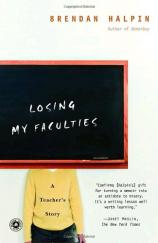Losing My Faculties: A Teacher's Story
Review
Losing My Faculties: A Teacher's Story
Brendan Halpin's new memoir, LOSING MY FACULTIES, which details his
work as a high school English teacher, will certainly ring a few
(school) bells for any disillusioned and exhausted teacher. This
label fits me to a tee, only needing a "former" added before the
teacher part. Halpin's woes were mine and I found myself on more
than one occasion nodding in commiseration.
Halpin begins his teaching career somewhat haphazardly, only
deciding late in his college career that he wants to be a teacher;
actually, he feels "called" to become a classroom teacher,
hopefully in an urban setting. He becomes aware that he is "just
one of those rare and probably defective people who really enjoy
the company of teenagers." Throughout the book, this dedication is
never in doubt. No matter how difficult his dealings with the
educational bureaucracy become, he never loses faith in the
goodness of kids.
And he does have some difficult dealings. His career begins at
Newcastle High, a lower middle class school where veteran teachers
usually beat the students out of the parking lot at the end of the
day and the kids are all tracked into one of three levels. As is
frequently the case with beginning teachers, Halpin is assigned
mostly Level 3 kids, those on the lowest track. On the first day,
one of his students notes, "So, I guess this is the retard class,
huh?" Halpin struggles to move his students beyond that type of
thinking, but is held up by his own inexperience and lack of
collegial support.
Throughout his early career, Halpin is plagued by the need to
establish some sort of authority. Hoping to achieve more of a
"we're all in this together" mentality, he neglects much classroom
management, which frequently leads to out-of-control kids. In one
particularly vexing situation, his students repeatedly ring the
"office call" button on their way out of the classroom. I want to
shake him at this point and say, "Brendan, just go stand by the
button when they're leaving the room!" His desire to be friendly
with the students prevents him from accomplishing many academic
goals.
The classroom management issues become less intense when Halpin
moves on to Northton High School, although his dissatisfaction with
his colleagues does not. While he comes more into his own as a
teacher, he still hopes to make large scale changes in public
education and finds his fellow teachers resistant, to say the
least. "Most of the staff seemed to live just for the bitter joy of
scorning anything new or any kind of meaningful talk about
education at all." In a move I just cannot forgive him for, Halpin
leaves Northton High School in the middle of the year to take a job
at a small foundation, "Famous Athlete Youth Programs" funded in
part by some unnamed and, at least in terms of the program,
invisible pro athlete. Eager to get his feet wet in the city,
Halpin works for a pittance for this truancy prevention program,
one that is suspect from the start. Although he does manage to
reach a few students, Halpin is once again caught in a web of
incompetent administrators and overwhelming bureaucracy.
Hoping to find an urban program with dedicated colleagues and
supportive administrators (silly, silly boy, I want to tell him)
Halpin signs on with "Better Than You" High School, a charter
school that aims to empower teachers, a novel idea in American
education. Having earlier longed for a school where teachers spent
hours engaged in philosophical discussions about education, Halpin
is now dismayed to find himself in just such a situation. The
endless discussions are mind numbing and "despite the fact that I
like and respect most of my colleagues, the work with the grown-ups
kind of sucks." Halpin comes to terms with his abilities and
desires, only to run into problems when the school engages a new
administrative team. In fact, they engage eight administrators for
only 200 kids and any veteran teacher can tell you that is a recipe
for disaster.
Halpin's simmering anger and resentment with Better Than You
parlays itself into yet another teaching situation and although
this is where LOSING MY FACULTIES ends, we have hope that he will
be truly able to utilize his talents in a functional environment.
Halpin doesn't offer high-minded prescriptions about the future of
education --- just a weary resignation that he can only do his job
within the confines of the present system, an acceptance that may
surprise many parents but not very many teachers.
Reviewed by Shannon Bloomstran on January 22, 2011
Losing My Faculties: A Teacher's Story
- Publication Date: August 10, 2004
- Genres: Nonfiction
- Paperback: 256 pages
- Publisher: Random House Trade Paperbacks
- ISBN-10: 0812969510
- ISBN-13: 9780812969511





